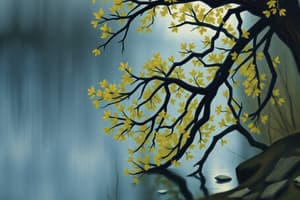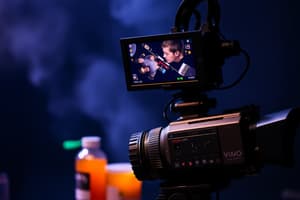Podcast
Questions and Answers
What type of film presents information or facts about a topic or issue?
What type of film presents information or facts about a topic or issue?
- Hybrid film
- Documentary film (correct)
- Narrative film
- Experimental film
Which film structure introduces characters and setting?
Which film structure introduces characters and setting?
- Plot twist
- Setup (correct)
- Confrontation
- Resolution
What type of camera shot focuses on a character's face or object?
What type of camera shot focuses on a character's face or object?
- Close-up shot (correct)
- Establishing shot
- Over-the-shoulder shot
- Low-angle shot
What type of film is intended to scare or unsettle the audience?
What type of film is intended to scare or unsettle the audience?
What measures a film's commercial success?
What measures a film's commercial success?
What type of shot sets the scene and establishes setting?
What type of shot sets the scene and establishes setting?
What type of sound originates from within the scene?
What type of sound originates from within the scene?
What type of film combines multiple genres or styles?
What type of film combines multiple genres or styles?
Flashcards are hidden until you start studying
Study Notes
Film Classification
- Narrative films: tell a story with a plot, characters, and setting
- Documentary films: present information or facts about a topic or issue
- Experimental films: explore new ways of storytelling or filmmaking techniques
- Animated films: use animation techniques to create moving images
- Hybrid films: combine multiple genres or styles
Film Structure
- Three-act structure:
- Setup: introduces characters and setting
- Confrontation: conflict or problem arises
- Resolution: conflict is resolved
- Character arc: character's transformation or growth throughout the story
- Plot twist: unexpected turn of events that changes the story's direction
Film Techniques
- Camera angles:
- Establishing shot: sets the scene and establishes setting
- Close-up: focuses on a character's face or object
- Over-the-shoulder: frames one character from behind the shoulder of another
- Lighting:
- High-key lighting: bright and even lighting
- Low-key lighting: dim and moody lighting
- Sound:
- Diegetic sound: originates from within the scene
- Non-diegetic sound: added in post-production (e.g. music, sound effects)
Film Genres
- Action films: feature high-energy action sequences and stunts
- Comedy films: intended to be humorous and entertaining
- Drama films: focus on character development and emotional conflict
- Horror films: intended to scare or unsettle the audience
- Romance films: focus on romantic relationships and emotions
Film Industry
- Production companies: responsible for financing and producing films
- Distributors: responsible for releasing films to the public
- Box office: measures a film's commercial success based on ticket sales
- Film festivals: showcase new and independent films to audiences and critics
Film Classification
- Narrative films have a plot, characters, and setting, telling a story
- Documentary films present information or facts about a topic or issue
- Experimental films explore new ways of storytelling or filmmaking techniques
- Animated films use animation techniques to create moving images
- Hybrid films combine multiple genres or styles
Film Structure
Three-Act Structure
- Introduces characters and setting in the setup
- Conflict or problem arises in the confrontation
- Conflict is resolved in the resolution
- Character arc refers to a character's transformation or growth throughout the story
- Plot twist is an unexpected turn of events that changes the story's direction
Film Techniques
Camera Angles
- Establishing shot sets the scene and establishes setting
- Close-up focuses on a character's face or object
- Over-the-shoulder frames one character from behind the shoulder of another
Lighting
- High-key lighting is bright and even
- Low-key lighting is dim and moody
Sound
- Diegetic sound originates from within the scene
- Non-diegetic sound is added in post-production (e.g. music, sound effects)
Film Genres
- Action films feature high-energy action sequences and stunts
- Comedy films are intended to be humorous and entertaining
- Drama films focus on character development and emotional conflict
- Horror films are intended to scare or unsettle the audience
- Romance films focus on romantic relationships and emotions
Film Industry
- Production companies finance and produce films
- Distributors release films to the public
- Box office measures a film's commercial success based on ticket sales
- Film festivals showcase new and independent films to audiences and critics
Studying That Suits You
Use AI to generate personalized quizzes and flashcards to suit your learning preferences.




